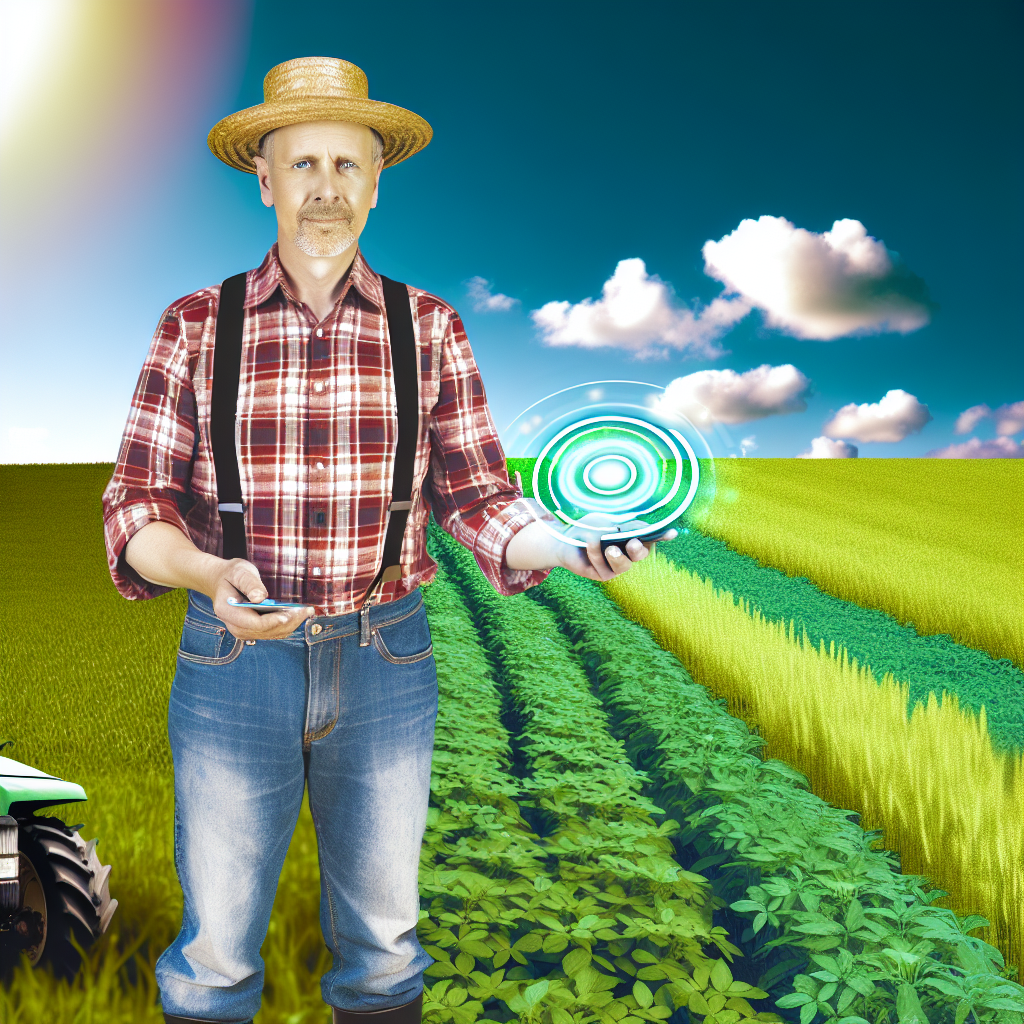Benefits of Biotechnology in Farming
Biotechnology plays a crucial role in sustainable agriculture.
This technology reduces the need for chemical pesticides.
This not only protects the environment.
It also safeguards the health of consumers.
Farmers can develop crops that thrive in harsh environmental conditions.
This is particularly important in the face of climate change.
Such advancements ensure food security for future generations.
Challenges and Concerns
Despite its numerous benefits, biotechnology in farming is not without challenges.
One major concern is the potential impact on biodiversity.
Genetically modified crops may outcompete native species.
There are also ethical concerns surrounding biotechnology in agriculture.
Critics argue it may lead to corporate control over food production.
Addressing these issues requires proper regulation and oversight.
Definition of biotechnology in farming:
Biotechnology in farming refers to the use of advanced technology in agriculture to improve crop yield, quality, and sustainability.
Explanation of how biotechnology is used in agriculture:
Biotechnology in agriculture involves genetic modification of crops to introduce desirable traits such as pest resistance or drought tolerance.
Through biotechnology, scientists can manipulate the genetic makeup of plants to enhance their growth and survival in various environmental conditions.
Examples of biotechnological applications in farming:
- Genetically modified (GM) crops, such as Bt cotton and herbicide-tolerant soybeans, are common examples of biotechnological applications in farming.
- GM crops have been engineered to produce their pesticides, reducing the need for chemical pesticides and promoting sustainable farming practices.
- Biotechnology is also used to develop crop varieties that are more nutritious and have a longer shelf life, addressing food security and nutrition challenges.
Benefits of Biotechnology in Farming:
Biotechnology has revolutionized the way we approach farming practices.
It offers numerous benefits that have the potential to transform the agricultural industry.
Let’s delve into the advantages of incorporating biotechnology into farming processes.
Increased Crop Yields:
Biotechnology has enabled farmers to develop crops that are more resilient to harsh environmental conditions.
Transform Your Career Today
Unlock a personalized career strategy that drives real results. Get tailored advice and a roadmap designed just for you.
Start NowThis allows for increased yields even in challenging circumstances.
By incorporating genetic modifications that enhance crop growth and productivity, biotechnology plays a crucial role in ensuring food security.
It helps in meeting the demands of a growing global population.
Reduced Need for Pesticides and Herbicides:
One of the significant advantages of biotechnology in farming is the reduction of reliance on harmful pesticides and herbicides.
Through the development of genetically modified crops that are resistant to pests and diseases, farmers can minimize the use of chemical interventions.
This promotes sustainable farming practices and safeguards the environment.
Improved Nutritional Content of Crops:
Biotechnology has the potential to enhance the nutritional value of crops.
It offers improved health benefits to consumers.
By introducing genetic modifications that increase the levels of essential nutrients in crops, such as vitamins and minerals, biotechnology contributes to the production of healthier and more nutritious food options.
Learn More: Poultry Farming Trends and Poultry Scientists
Challenges of Biotechnology in Farming:
Biotechnology has revolutionized farming practices worldwide.
However, with these advancements come several challenges that need to be addressed for sustainable agriculture and food production.
Concerns about Genetically Modified Organisms (GMOs)
GMOs have been a topic of debate due to concerns about their impact on human health and the environment.
Critics argue that GMOs may have unpredictable long-term effects on the ecosystem and biodiversity.
Proponents of GMOs claim that they have the potential to increase crop yields, reduce the need for chemical pesticides and fertilizers, and enhance nutritional value.
However, the lack of long-term studies on the health and environmental effects of GMOs remains a major concern.
Environmental Impacts of Biotechnological Practices
Biotechnological practices, such as genetic engineering and gene editing, can have unintended consequences on the environment.
For example, the development of herbicide-resistant crops can lead to the overuse of herbicides, which can harm local ecosystems and wildlife.
Moreover, the cultivation of genetically modified crops may disrupt natural pollination processes, affecting the populations of beneficial insects like bees and butterflies.
Showcase Your Business Today
Reach thousands of readers actively exploring professional services. Publish your business profile and grow your audience now.
Publish NowIt is essential to assess the environmental impacts of biotechnological practices thoroughly before widespread adoption.
Ethical Considerations Related to Biotechnology in Agriculture
The use of biotechnology in agriculture raises ethical concerns related to food safety, consumer choice, and economic disparities.
Critics argue that the patenting of genetic material and seeds by biotech companies limits farmers’ rights and undermines food sovereignty.
Moreover, the potential for genetic contamination between genetically modified and conventional crops raises questions about coexistence and the protection of organic farming practices.
Ethical considerations must be taken into account to ensure that biotechnological advancements benefit society as a whole.
Discover More: Dairy Scientist’s Involvement in Cheese Production
Future trends in biotechnology and farming practices:
– Continued development and adoption of genetically modified crops
– Integration of precision agriculture techniques
– Use of biotechnology to address climate change and food security challenges
Continued development and adoption of genetically modified crops
Genetically modified crops have been a topic of debate for years.
They continue to play a significant role in the future of farming practices.
With advances in biotechnology, scientists are able to modify crop plants.
These modifications help crops exhibit desirable traits such as resistance to pests, diseases, and drought.
These genetically modified crops increase yields.
They also reduce the need for chemical pesticides.
Ultimately, this benefits both farmers and consumers.
Integration of precision agriculture techniques
Precision agriculture is a farming management concept that uses technology.
This technology optimizes field-level management with regard to crop farming.
Farmers can efficiently monitor and manage their crops by using GPS guidance systems, sensors, and drones.
This approach allows for more precise application of resources.
Resources include water, fertilizers, and pesticides.
As technology continues to advance, we can expect an increase in the adoption of precision agriculture techniques.
This will improve productivity and sustainability in farming practices.
Use of biotechnology to address climate change and food security challenges
Climate change and food security are two of the most pressing issues.
These issues are currently facing the agriculture industry.
Biotechnology offers promising solutions to mitigate these challenges.
Scientists are working on developing crops resilient to extreme weather conditions.
These crops can thrive in a changing climate.
Moreover, biotechnology can also help in developing crops with enhanced nutritional value.
This addresses food security concerns in regions with malnutrition.
By leveraging biotechnology, farmers can adapt to climate change.
This ensures food security for future generations.
Learn More: Grape Breeding and Genetic Research

In the Realm of Sustainable Agriculture
Biotechnology plays a crucial role in driving innovation and promoting environmentally-friendly farming practices.
By leveraging biotechnological advancements, farmers can increase productivity, reduce environmental impact, and ensure food security for future generations.
Importance of Biotechnological Advancements
- Enhancing crop yields and quality: Biotechnology allows for the development of genetically modified crops that are more resistant to pests, diseases, and harsh environmental conditions.
- Reducing chemical inputs: Through biotechnology, farmers can adopt practices such as precision agriculture to minimize the use of pesticides and fertilizers, thus reducing their impact on the environment.
- Improving resource efficiency: Biotechnological solutions enable the development of crops that require less water and land to cultivate, helping to conserve natural resources.
- Promoting sustainable farming techniques: Biotechnology paves the way for the adoption of conservation practices like no-till farming, which helps to prevent soil erosion and improve soil health.
Examples of Sustainable Farming Practices Enabled by Biotechnology
- Genetically modified crops: GM crops, such as insect-resistant corn and herbicide-tolerant soybeans, help farmers reduce the need for chemical inputs while increasing yields.
- Precision agriculture: By using technologies like GPS mapping and drones, farmers can apply inputs more precisely, reducing waste and improving efficiency.
- Drought-tolerant crops: Biotechnology has enabled the development of crops that can thrive in arid conditions, helping farmers adapt to changing climate patterns.
- Natural pest control: Biotech solutions like biopesticides and pheromone traps offer eco-friendly alternatives to chemical insecticides, preserving beneficial insects and pollinators.
Biotechnology holds immense potential in transforming agriculture into a more sustainable and eco-friendly industry.
By embracing biotechnological innovations, farmers can enhance their productivity while mitigating the negative impacts of conventional farming practices on the environment.
As we look towards the future of farming, biotechnology will undoubtedly play a critical role in shaping sustainable agricultural practices for generations to come.
Explore Further: The Future of Food Science: Trends to Watch
Biotechnology and the Future of Farming Practices
Regulation of biotechnology in farming:
– Overview of current regulations governing biotechnology in agriculture
Showcase Your Business Today
Reach thousands of readers actively exploring professional services. Publish your business profile and grow your audience now.
Publish Now– Discussion of the role of government agencies and international organizations in ensuring the safety and efficacy of biotechnological applications in farming
Current regulations governing biotechnology in agriculture:
In the agricultural sector, biotechnology is a rapidly growing field.
New advances are made regularly.
It is crucial to have comprehensive regulatory frameworks in place.
Such frameworks ensure that development and implementation of biotechnological applications in farming are done safely and responsibly.
Regulations governing biotechnology in agriculture vary from country to country.
Some nations have more stringent rules than others.
In the United States, for example, several agencies regulate biotechnological products.
The USDA, EPA, and FDA assess safety and efficacy of biotechnological products before commercialization.
These agencies analyze data provided by biotechnology companies.
They determine if these products have adverse effects on human health, environment, or non-target organisms.
In Europe, regulation is overseen by the European Commission and European Food Safety Authority (EFSA).
The EU has a precautionary approach, requiring thorough risk assessments before product approval.
These regulations protect consumers, farmers, and the environment from potential risks.
They ensure that only safe and beneficial products reach the market.
Transparency and accountability are key elements in this regulatory process.
Role of government agencies and international organizations:
Government agencies and international organizations have a crucial role in regulating biotechnology in farming.
They collaborate to set standards and harmonize regulations.
It is essential that biotechnological applications are safe, effective, and beneficial for all stakeholders.
In the United States, USDA, EPA, and FDA work together to evaluate safety.
They conduct thorough assessments based on scientific data, public feedback, and expert opinions.
This process helps in making informed decisions about biotechnological applications in agriculture.
Internationally, organizations such as WHO, FAO, and OECD establish guidelines and best practices.
These organizations facilitate information sharing and technical assistance.
They help countries develop robust regulatory frameworks.
International bodies also conduct risk assessments and monitor field developments.
Promoting dialogue among stakeholders ensures responsible and sustainable use of biotechnology.
Overall, regulating biotechnology in farming is complex and multifaceted.
Collaboration is necessary among governments, regulatory agencies, international organizations, and other stakeholders.
This cooperation ensures biotechnological applications in agriculture are safe, effective, and align with sustainable development goals.
Implications of Biotechnology in Agriculture
Biotechnology plays a crucial role in revolutionizing farming practices for a sustainable future.
It is evident that biotechnology has the potential to address global challenges in agriculture.
Advancements in biotechnology offer innovative solutions to enhance crop yield and quality.
Furthermore, biotechnology can help in developing crops with resistance to pests, diseases, and adverse environmental conditions.
Investing in research and development of biotechnology is essential for the future of agriculture.
Therefore, a call to action is needed to support continued research and innovation in biotechnology.
By leveraging biotechnology, we can ensure food security, environmental sustainability, and economic growth.
Embracing biotechnology is crucial for shaping the future of farming practices.
Let us work together to harness the power of biotechnology for the benefit of agriculture and society as a whole.
Additional Resources
USDA Science and Research Strategy, 2023-2026: Cultivating …
Showcase Your Business Today
Reach thousands of readers actively exploring professional services. Publish your business profile and grow your audience now.
Publish NowBold Goals for U.S. Biotechnology and Biomanufacturing …
[E-Books for Sale]
The Big Book of 500 High-Paying Jobs in America: Unlock Your Earning Potential
$19.99 • 500 High-Paying Jobs • 330 pages
Explore 500 high-paying jobs in America and learn how to boost your career, earn more, and achieve success!
See All 500 High-Paying Jobs of this E-Book
1001 Professions Without a Degree: High-Paying American Jobs You Can Start Now
$19.99 • 1001 Professions Without a Degree • 174 pages
Discover 1001 high-paying jobs without a degree! Unlock career tips, skills, and success strategies for just $19.99!




